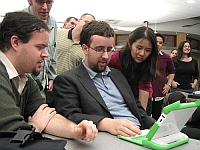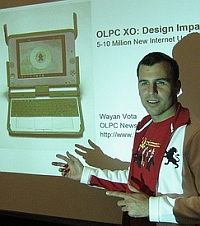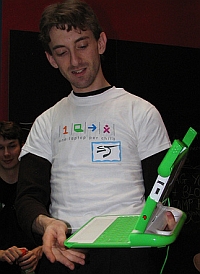Over the past few days I spent some time looking back through some of the news-stories and comments posted here on OLPC News and in other on- and offline publications.
What I realized is that, at times, serious discussions about issues and topics doesn't seem possible anymore because it feels like by now everyone has an opinion on the OLPC project. And everyone is dug into little shelters protecting their opinion, sometimes along trenches with other people, sometime alone in a corner. But there's certainly a lot of no man's land in between all those opinions.
That's of course a situation that happens with lots of controversial topics. What I'm noticing however is that unlike many other discussions the criticism of One Laptop Per Child and also the criticism of that critique follows very similar patterns. The arguments might differ but most people on both sides of the discussion employ the same techniques and look for weaknesses in the same spots.
So here's a short list of the most popular attacks which regularly come up when discussing the Children's Machine XO:
Who are you and where is your credibility supposed to come from? Hello, my name is Christoph Derndorfer, I'm 22 years old and I'm currently working on my bachelor in computer science at the Vienna University of Technology.
Now, did that information help you in deciding how credible, relevant, useful, interesting, etc. my previous posts and comments here on OLPC News are? I didn't think so either.
First of all that information I gave you could be completely wrong. I could have just as easily said that I'm a 54 year-old professor at the University of (insert random name) who's been working on sustainable development for the better part of the past 20 years. Would that make my opinion and comments more credible? Some might say yes, personally I'm going for no.
Discussions on the Internet have one large flaw: you don't really know who the other participants are. On the other hand the internet also offers a huge advantage: you don't really know who the other participants are. So if you're serious about an exchange of thoughts and opinions while discussing something then you'll have to take people by their word.
Attacking someone on the basis of their gender, religion, geo-political background, current or past employer(s), etc. isn't the best thing to do in real life. On the internet it's quite useless anyway because if I wanted it wouldn't be too hard to fake some other (more credible) identity just for the sake of "winning" an argument.
You are so convinced that the OLPC project is good/bad, you must have some kind of hidden agenda! Again, this is another very popular attack to invalidate your opponent's opinion and comments.
First of all I believe that only very few people involved in the discussions around the OLPC project actually have an agenda other than making their voice heard.
Frankly speaking neither most of you reading these lines nor me writing them at the moment will actually feel a lot of impact from the success or failure of the OLPC project. There's of course always chaos theory and the butterfly effect to turn back to, but that's a different story.
So having said that and assuming that most of the people commenting on OLPC aren't involved with Quanta Computers, Intel, Microsoft or any other stakeholder in this "market" I'm lead to believe that it's simply a matter of sharing your own opinion.
What have you yourself contributed to the OLPC project or any other worthy cause? This is a popular comment used to challenge people who are critical of the OLPC project. First of all it's interesting because most of the people using that argument probably haven't contributed anything themselves other than verbally defending the project in on- and offline rants.
At least I've never seen Christopher Blizzard or anyone else directly involved in the project using that to weed out opposition. Why? Probably because they're too busy actually getting work done.
One of the characteristics of constructive criticism is that you're supposed to offer a solution when you're skeptical of something. However often things simply don't work like that. I think for a decent discussion it's vitally important to also accept criticism which isn't coupled with an idea on how to address the issue in question.
There's a million issues out there in the world that I like to discuss about and where I'm also highly skeptical of certain developments. However I'll be the first one to admit that more often than not I personally don't have the answers somewhere up my sleeves. Does that mean my arguments, thoughts and opinions are worthless?
I could go on but I think these three aspects highlight the main trends when discussing the OLPC project. What I'd personally like to see is a more open and honest discussion about this unique initiative.
I believe it should be possible to allow for more tolerance within these discussions and we should all try to find more common ground. As I recently put it into an e-mail to Wayan:
"...I love the idea of an open exchange of opinions between different people and reading other people's thoughts who often put things into a very different perspective than I'd normally do.".





Christopher, let me be the first to express total agreement with your ideas. I do believe that the purpose of this site is to engage in a frank discussion about the OLPC project. Anyone can be wrong, or even partially wrong, but as long his or her opinion is expressed in an articulated and polite way, I'm more than willing to read it and discuss it in the same way, assuming good will and the best of intentions. Without that, there's little hope to get anything done.
Here-Here! I totally agree. The point in discussions is exactally that - to discuss the issues and hopefully address them constructively. To blindly slam people when they poke holes at projects that they legitimately feel are things that need discussed it rediculous.
Remember this - just because a project sounds good - because someone has a good PR machine - and has the word "children" in it does not mean it is JUST good. I can point to many pieces of US legislation that put the word "children" in it to provoke an emotional response that were totally wrong for the country! Just because we criticize a solution does not mean we dont believe in the underlying cause - it just means we have issues with the way it is being handled and would like some HEALTHY debate on it.
To the above statements let me add that the goal of the discussion should be to get at the truth - to test (and presumably to measure) the accuracy of various statements and propositions upon which the project rests.
One of the more common responses I have had on my blog in the early days was "I trust MIT to do the right thing". This statement is an expression of faith and has nothing to do with the facts under discussion. I countered it by discussing the engineering flaws of the proposed implementation of hand crank power generation, where actual numbers could be compared. One or two respondents dismissed my numbers because I had used kg where Newtons would have been the purer unit (though this is common engineering practice). I'm happy to have only those kinds of responses to deal with, though I'd rather have more substantive rebuttals.
Throughout the time I have been publishing as a critic I have had no communication from anyone directly involved in OLPC to attempt to refute my position. It's not that I was unknown to them - Mihail Bleitsas, when I approached him after a talk he gave said that he had spotted me in the audience, and said that I had written "some poisonous things". I chose not to ask "poisonous, perhaps, but are they untrue?" - probably because I wanted to ask him some other questions and didn't want the conversation to end abruptly.
My fundamental complaint against OLPC is the lack of a sound intellectual footing, as I have stated in my recent post here on OLPC News. No doubt they will, as they have in the past, dismiss the call for debate and discussion with the statement that the time for such things has passed and now it remains to take action. Many, many regrettable acts have been justified in such a way in the past, and the results have often been blamed on engineers and technologists who passively accepted such rhetoric.